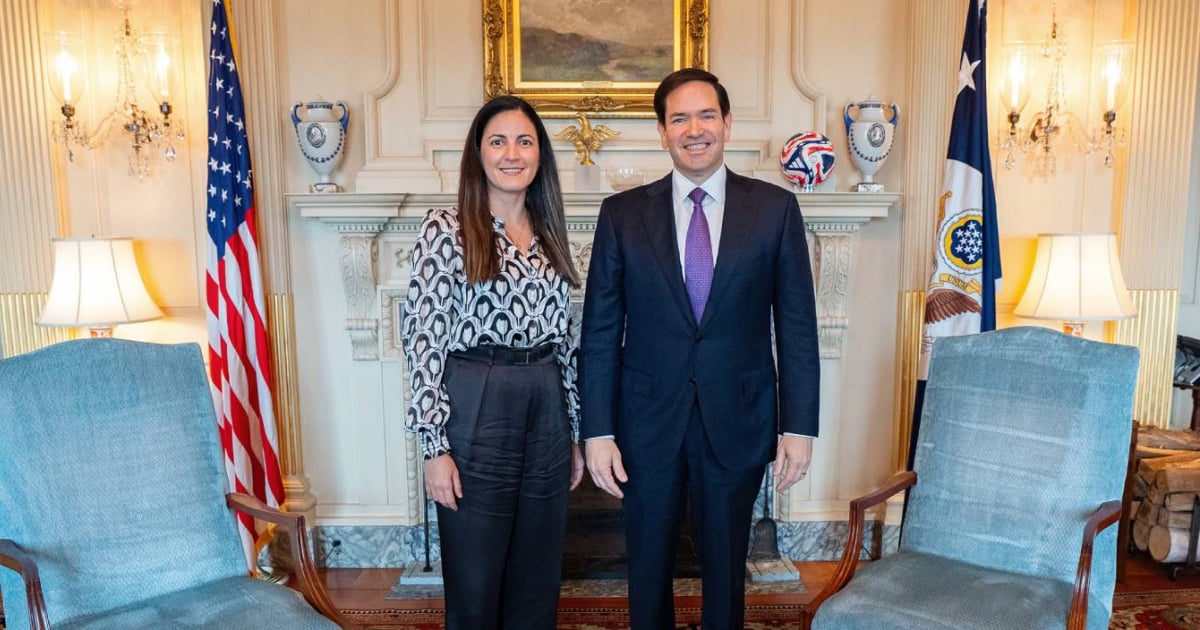The U.S. Secretary of State, Marco Rubio, held a meeting with the Cuban opposition leader and human rights activist Rosa María Payá Acevedo, who has been nominated by Washington as a candidate for the Inter-American Commission on Human Rights (IACHR).
Rubio praised Payá’s dedication and commitment over more than a decade of activism for freedom in Cuba and the hemisphere, calling her a “strong advocate for democracy and fundamental rights.”
“His clear vision and moral integrity would make the IACHR more effective, efficient, and responsive to the peoples it serves,” said the Cuban-American official on his official X account.
“I urge the OAS member states to support their candidacy on June 27,” he added.
The nomination of Rosa María Payá has received strong support from Republican leadership in the United States.
Congresswoman María Elvira Salazar stated that the activist represents “a courageous voice for freedom across the continent,” while Representative Mario Díaz-Balart asserted that her election would be “a boost to the independence and credibility” of the CIDH.
Rosa María Payá is the daughter of the late opposition leader Oswaldo Payá and has continued his legacy through initiatives such as the Cuba Decide project, which advocates for a binding referendum that allows Cuban citizens to choose their political system.
She also presides over the Foundation for Pan-American Democracy and hosts the program “Tú Decides” on Radio Martí, where she promotes civic activism and peaceful resistance against authoritarian regimes.
After learning of her nomination, Payá publicly thanked the support of the U.S. government: “I am deeply honored by this nomination to serve on the IACHR, a vital institution for the protection of rights across the continent,” she expressed on social media.
The elections to renew three positions in the Inter-American Commission on Human Rights (CIDH) will be held on June 27, 2025, during the General Assembly of the Organization of American States (OAS) to take place in Antigua and Barbuda.
The candidates have been presented by various member countries and outlined their platforms in public sessions in May.
In his speech before the OAS in 2024, Payá urged states to take a firm stance against the authoritarian regimes of Cuba, Nicaragua, and Venezuela: “It is time for the states of the Americas to unite against dictators,” he stated at that time.
The meeting between Marco Rubio and Rosa María Payá strengthens the institutional and political support for the Cuban activist’s candidacy, who could become one of the key voices in the defense of human rights in the hemisphere.
Frequently Asked Questions about Rosa María Payá’s Nomination to the Inter-American Commission on Human Rights
Rosa María Payá is a Cuban human rights activist who has continued her father’s legacy, the late opposition leader Oswaldo Payá. She is known for her leadership in the Cuba Decide movement, which promotes a binding referendum so that Cubans can freely choose their political system. Additionally, she leads the Foundation for Pan-American Democracy and hosts the program “Tú Decides” on Radio Martí, where she advocates for civic activism and peaceful resistance against authoritarian regimes.
Rosa María Payá has been nominated to the IACHR for her unwavering commitment to the defense of human rights and democracy. The nomination has been supported by the United States government, highlighting her track record as a defender of freedom in Cuba and the hemisphere. Her election is seen as crucial for strengthening the independence and credibility of the IACHR in its role of protecting human rights in the Americas.
The election to renew three positions in the IACHR will be held on June 27, 2025 during the General Assembly of the Organization of American States (OAS) in Antigua and Barbuda. This election is crucial as it will determine the leadership and future direction of the IACHR, a vital body for the promotion and protection of human rights on the continent. The election of Payá is seen as an opportunity to revitalize and strengthen the Commission’s impact.
